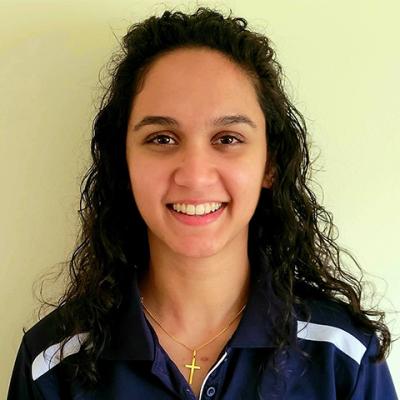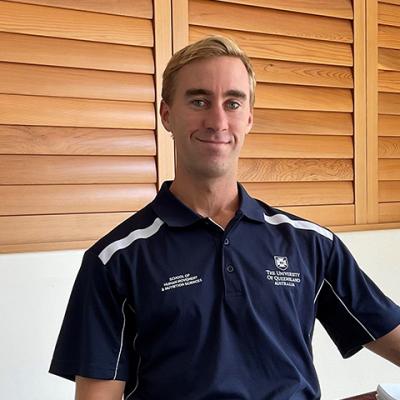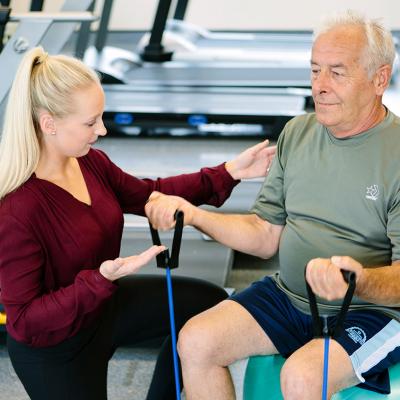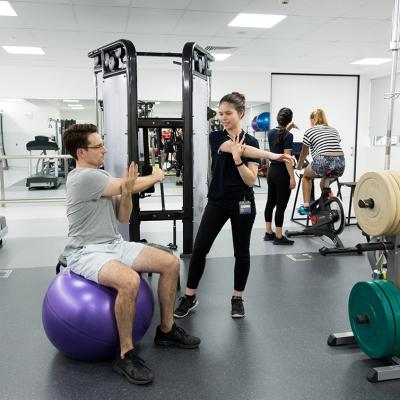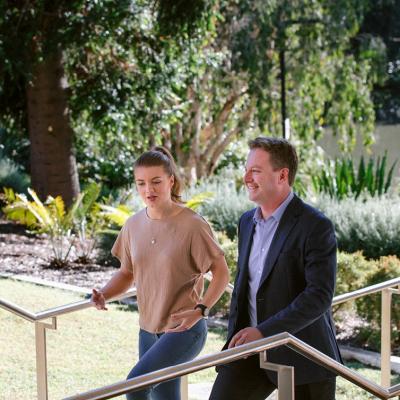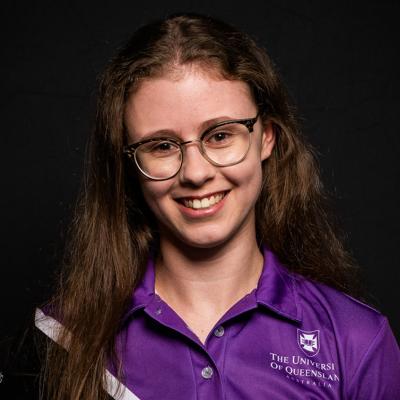Considering studying exercise physiology at university? You may have lots of questions. We're here to help you find answers.
- Why study clinical exercise physiology?
- What will you learn in a clinical exercise physiology degree?
- What does a day in the life of a clinical exercise physiology student look like?
- What kind of job can you get with a degree in clinical exercise physiology?
We've interviewed 2 recent UQ graduates to find out. Luke Caughey and Mariella Bernard studied the Bachelor of Clinical Exercise Physiology (Honours) and they’ve teamed up to answer some of your questions and share their experiences, to give you a better idea of what to expect from this degree.
Let's find out if exercise physiology sounds like the study area for you.
What’s the most unexpected thing you learned while studying clinical exercise physiology at UQ?
Mariella: As all humans are different and clients will always present with different values and ideas pertaining to exercise. There is no textbook defined answer to manage each specific presentation. This has taught me to be flexible in tailoring my approach to provide the best possible management or care.
Luke: The impact of public health policies on population-wide health trajectories is something I had not considered, nor would have I seen myself being so interested in.
What’s it really like to study clinical exercise physiology?
Mariella: The role of working in the healthcare sector and helping people overcome or manage their health issues to the best of my ability has always been something I have dreamt of. Through studying clinical exercise physiology, I have been able to do just that. Working with a wide range of qualified healthcare professionals and a diversity of clients makes it a very exciting program that aims to have students work-ready upon graduation.
Luke: It is a diverse experience, covering public health to foundational science into the ultimate topic of exercise for health and rehabilitation. You can build your foundational health knowledge across a wide variety of critical areas that eventually flourish into a solid base upon which you can begin to translate into health and exercise.
"You also have the chance to access world-class researchers and facilities, while also creating great friendships to have many laughs along the way."
What drew you to study clinical exercise physiology?
Mariella: I wanted to further my knowledge in an area that would complement my prior experience as a student physiotherapist in Sri Lanka. Additionally, it was my long-standing desire to be able to assist clients with clinical conditions beyond what I learnt as a student physiotherapist.
Luke: Sport and exercise have been a cornerstone in my life for as long as I can remember. I always knew I wanted to do something with the human body. Upon stumbling across clinical exercise physiology, my search was done. The diverse outcomes as a graduate exercise physiologist were of particular interest to me. I loved the fact I could attain a job in a hospital or a job with athletes.
What are the most valuable skills you learned while studying clinical exercise physiology?
Mariella:
- Building rapport through active listening and being time efficient.
- Interprofessional care collaboration (with physiotherapy, OT and dietetics students).
- Tailoring exercise prescription to suit client needs and according to current evidence.
Luke: The skill I will take with me throughout my career is the ability to produce solutions and answers to complex questions. Assignments conducted throughout my studies have provided me with a framework to critically appraise a topic or question with the available evidence, then to translate this into a solution or answer to ultimately help someone with their journey.
What does a day in the life of a clinical exercise physiology student look like?
Mariella: My typical day included a mixture of hours spent at lectures, tutorials, workshops, or practicals (for my research project), with time at home used for additional research, assignment write-ups or planning, part-time work, exercise, and family time.
Luke: Some days you will find yourself engrossed in the anatomy facility learning the complexities of the human body with human cadavers, a truly invaluable experience. Other days you will find yourself putting your theoretical knowledge into practice conducting or delivering tests such as the lactate threshold or V02max test.
What have you learned about yourself since you started your studies at UQ?
Mariella: I have developed my confidence in facing clients, peers, and other allied health professionals.
"I am able to voice my opinions in group settings and to respect the thoughts and views of others, to come to a shared decision."
Luke: I have learnt not to doubt myself. When I began, I was constantly worrying that I would fail an assessment piece or a subject. However, I never gave up, I tried my hardest and I would always end up succeeding.
How have your teachers had a positive impact on your studies?
Mariella: The relationship I have had with my lecturers and tutors at UQ has been wonderful. They were always approachable, ever willing to answer my questions in a timely manner, helped me solve problems related to coursework and, most importantly, treated me with respect.
Luke: The lecturers and tutors at in Human Movement and Nutrition Sciences (HMNS) are world class at opening your understanding to new levels. They create an environment which stimulates learning, sparks interest, and encourages a true passion to learn. The staff are extremely open and will help facilitate your learning, filling any gaps required.
Where do you want to go or what do you want to do in your clinical exercise physiology career?
Mariella: I have always been drawn to working with neurological and cardiac populations. This is because I enjoy understanding the pathophysiology of the relative conditions and how exercise could complement the management of these conditions. I would like to undertake research into identifying methods to control the common symptoms of Parkinson’s disease, as the symptoms are quite debilitating and impact quality of life.
Luke: I want to help people achieve their health and fitness goals and aid them to find the same passion and euphoria I get from physical activity. As a graduate, I am working as a clinician alongside people with neurological conditions in a rehabilitation clinic.
What’s the most interesting thing you learned that wasn't part of your coursework?
Mariella: ISBAR (Identify, situation, background, assessment, recommendation) – a simple acronym used for effective handovers. I learnt this while I was on placement and was introduced to it by a physiotherapist when I had to hand over a client to her.
Luke: Learning about human evolution and its impact on today's increased sedentariness and decreased physical activity levels was eye-opening. Exercise (movement that is planned and structured) is something relatively foreign to humans. We never used to run 10 kilometres or sweat it out for 45 minutes in a small room just for the fun of it!
"Fostering the motivation to move in the modern, industrialised world requires creativity."
What advice would you give to someone who wants to study clinical exercise physiology at UQ?
Mariella: Put your hand up and take each opportunity given – say ‘YES’. Always have a questioning mind and try to figure things out for yourself by researching. If you cannot find the answer, ask someone.
Luke: Trust the process and don't stress if you're not feeling confident with a certain topic. You will have multiple chances to practise required skills. Enjoy the process and take advantage of the countless resources and opportunities.
Explore the Bachelor of Clinical Exercise Physiology (Honours) or discover what it's really like to study other programs at UQ.


